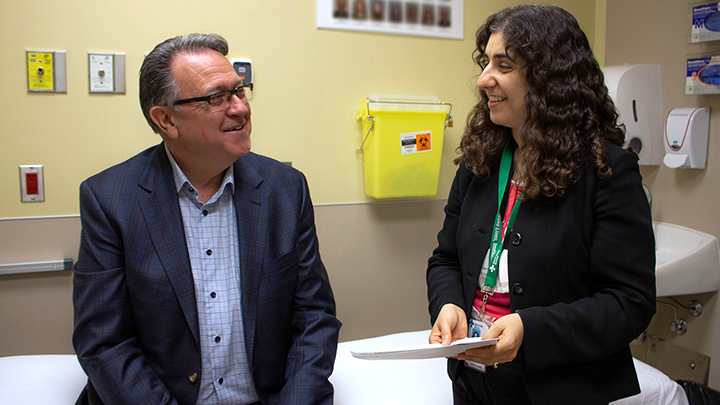
June 24, 2019

Calgarian Greg Smith got involved in an Alberta Health Services-supported research study led by neurologist Dr. Farnaz Amoozegar. As a result, he’s now receiving a new migraine medication that’s changing his life.
Story by Greg Harris | Photo by Janelle Anderson
To try to stop a debilitating migraine from coming on, Calgarian Greg Smith has learned to avoid triggers such as the strong fragrances in the grocery store detergent aisle.
Even the smell of red wine, hard liquor or perfume can be enough to set him off. Other triggers, such as Calgary’s Chinooks, are unavoidable.
Participating in a research study, however, has given Smith his life back.
Thanks to a special exemption, Smith has been receiving a new drug that’s still awaiting Health Canada approval. It’s the same drug he received when he participated in a research trial in Calgary in 2017 that looked at the effectiveness of different doses of the drug.
“I’ve tried numerous medications before and this is the only thing that comes close to keeping the headaches in check,” Smith says. “I’ve been getting involved in research studies for a long time as a way of paying it forward; this study has really changed my life.”
Every day, research participants in Alberta help advance patient care. Some – like Smith – may benefit directly, but all help advance treatments for the patients who come after them.
AHS supports thousands of new and ongoing studies that use AHS facilities and systems and utilize robust data. Whether it’s related to cancer or cardiovascular health, mental health or nephrology, AHS enables world-class researchers across the healthcare continuum to translate discoveries that will improve patient outcomes and health system performance.
“Research studies give us the evidence we need to make decisions around patient care,” says Dr. Farnaz Amoozegar, an Alberta Health Services neurologist and the migraine researcher who was the site lead for the study Smith became involved in.
“Migraine is a common and disabling condition and there is a significant need for new medications,” she says. “The only way we can test those is through clinical trials.”
There are currently more than 3,500 active clinical research studies across the province; last year alone, research ethics boards in Alberta approved more than 1,400 new studies requiring involvement by AHS.
Through clinical trials, researchers have discovered less invasive surgical techniques, drugs with fewer side effects, and treatments that improve patient outcomes.
AHS hospitals in Edmonton and Calgary have made the list of a national ranking of the top-40 research hospitals for three consecutive years.
“Another advantage to research activity and innovative thinking,” says Dr. Kathryn Todd, Vice President System Innovations and Programs, “is that all our patients and clients benefit, even those who did not directly enroll in a study. Health systems with active programs of clinical research are known to achieve better outcomes for all.”
Marc Leduc, AHS Senior Provincial Director, Health Evidence and Innovation, notes that clinical research increases AHS’ ability to attract and retain talented clinicians who are keen to ask difficult questions that will improve the well-being of Albertans.
“More importantly, our patients have told us how research studies give them hope and meaning,” he says.
For Greg Smith, participating in a research study has reduced the number of migraines he has in a month from 10-12, down to only one or two.
“At its worst, and without medication, migraine can be absolutely devastating,” Smith says. “The medication I’m on now, though, is revolutionary and has given me a new lease on life. It wouldn’t have been possible without research.”
For more information on how to participate in research, see ahs.ca/ParticipateResearch. The web page includes a section called ‘Find a study that is right for you’ that has links to searchable databases of studies going on in Alberta and elsewhere.
When Calgarian Greg Smith signed up for a research study in 2017 that tested a new medication for migraine, little did he know how much it would change his life.
Smith wound up being one of 875 participants in an international clinical trial that tested Teva Branded Pharmaceutical’s Fremanezumab, which is a type of medication called a “biologic.”
“Biologics are often used to treat auto-immune diseases like rheumatoid arthritis or certain types of cancers, but they’re quite new for treating migraine,” explains Dr. Farnaz Amoozegar, neurologist and Calgary site lead for the study.
In this case, the medication targets a protein known to trigger migraines and which also plays a role in the pain pathways associated with migraine. The drug is designed to block the activity of the protein.
Fremanezumab has already been well researched and in the study that included Calgary as one of the sites, researchers looked at optimizing dosages. The study was conducted out of the Calgary Headache Assessment and Management Program at South Health Campus.
Dr. Amoozegar anticipates Fremanezumab will receive approval from Health Canada later this year or early in 2020, making it the second biologic approved for migraine in Canada.
The company offered Smith extended access to the drug on compassionate grounds because he participated in the research study. He receives a set of injections every three months.
“It’s not that common, but companies sometimes recognize that patients spend the time and effort to participate in clinical trials, so they offer it as a gesture of appreciation,” Dr. Amoozegar says.